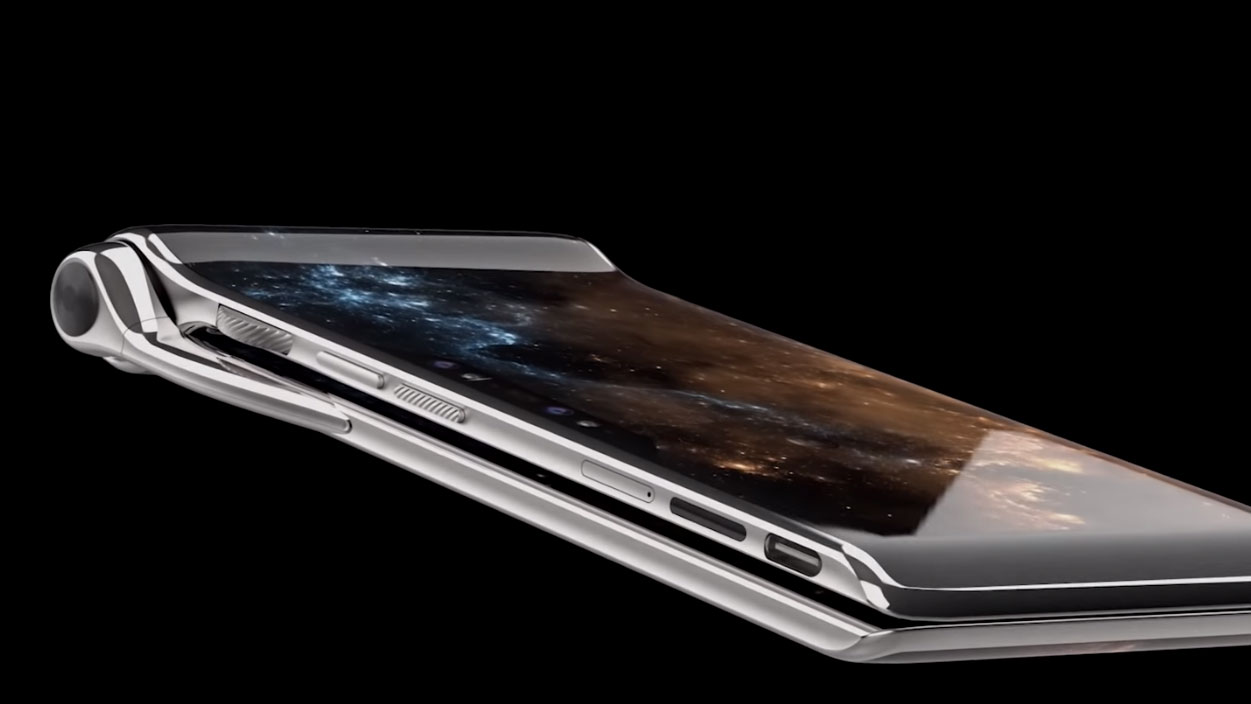HubblePhone is an insane, dual-screen, folding smartphone that will arrive in 2020
Well...if it actually arrives

Sign up for breaking news, reviews, opinion, top tech deals, and more.
You are now subscribed
Your newsletter sign-up was successful
The HubblePhone looks absolutely bonkers, and we're intrigued. A smartphone that appears to have more screens than you can shake a stick at, a bending, folding arm and multiple cameras.
However, Turing is the firm behind the HubblePhone, and if that rings a bell it's because the company has already tried a couple of times to launch a smartphone, but couldn't deliver on all orders and ultimately it ended up filing for bankruptcy earlier this year.
This came after previous phones were scrapped or refunds offered due to the spec sheet not being impressive enough and delays to manufacture / shipping - the company has yet to ship a phone on a widespread scale.
Some customers were left upset at the previous attempts, yet the firm has returned, and it's shared a concept video and a handful of renders of the device with Digital Trends and if you can look past the chequered history, it's fair to say it's got our attention.

Screen for days
Digital Trends reports that the handset has two screens, but taking a closer look at the teaser video we can see four flat sides to the device and every single one appears to be clad in a display.
What we assume is the 'main' display appears to wrap over the bulging top of the HubblePhone and allow the way down its rear. Then there's the foldout section which looks to have a screen on either side of it.
The display that sits against the other half of the phone looks to have a camera built into a notch at the top of the screen as well.
Sign up for breaking news, reviews, opinion, top tech deals, and more.

Serious camera, multiple realities
That large camera embedded into the top of the device, and pointing out the side like a camcorder - reminding us of the Nokia N93 - is said to have a staggering 15x optical zoom.
Optical zoom is something of a rarity in the smartphone world, as the camera modules need to be small enough to fit into the form factor which means most handset rely on a digital zoom, which reduces image quality when zooming in.
An optical zoom allows you to get closer to your subject without any loss of quality and up until now it's been reserved for quirky handsets such as the Samsung Galaxy S4 Zoom and Galaxy K Zoom.
Turing also claims that the HubblePhone will feature video editing software that "dwarfs any available on today’s smartphones", although has not provided any further information or clarity on what that would mean in comparison to current models.
Other points to note about the device is that it'll supposedly run not one, but two Snapdragon 855 chipsets, be 5G ready and use AR (augmented reality), VR (virtual) and MR (mixed) for a new gaming experience.
It's worth noting that the Snapdragon 855 chipset is expected to launch in December 2018, and while the HubblePhone will apparently boast two under the hood, when/if the phone arrives in 2020 they will no longer be cutting edge.

Sky-high price
A common theme that's been carried over from Turing's previous smartphone attempts is its pricing strategy. The HubblePhone is going to cost an awful lot.
The HubblePhone price is set a $2,750 (around £2,090, AU$3,700) which would make it one of the most expensive smartphones out, and especially considering you have to wait until 2020 to get your hands on a device that won't be running the latest engine under the hood.
Turning says the HubblePhone release date will be June 2020 for the US, August 2020 for Europe, September for China and the rest of the world by December.
The HubblePhone sounds too good to be true, which is likely what Turing is trying to achieve by making this phone public now. A great idea with eye-catching concept renders, but we'll have to wait until 2020 to see if it ever makes it to reality.

TechRadar's former Global Managing Editor, John has been a technology journalist for more than a decade, and over the years has built up a vast knowledge of the tech industry. He’s interviewed CEOs from some of the world’s biggest tech firms, visited their HQs, and appeared on live TV and radio, including Sky News, BBC News, BBC World News, Al Jazeera, LBC, and BBC Radio 4.